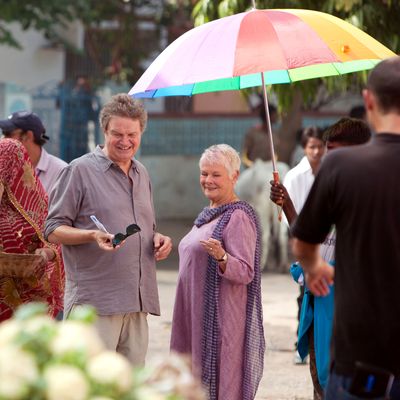
The aging-Brits-in-foreign-lands movie has gone beyond the realm of the trite and become its own genre at this point, so it seems unsporting to poke holes in The Best Exotic Marigold Hotel for doing pretty much what others of its ilk do: offering up a predictable menu of old regrets and new beginnings in a lush, exotic locale. For some viewers, this sort of thing is like a familiar, comfortable pair of slippers; for others, a tired discard. At times, John Madden’s film feels like both.
Still, there’s a bit of timeliness to this particular vintage of British retirees. Many of them are compelled to move to India in search of not just happier endings but affordable lives, thanks to some contemporary market forces: Picky and perhaps even somewhat racist Muriel (Maggie Smith) can’t afford a hip replacement in the U.K.; Evelyn (Judi Dench) is forced to sell her home in the wake of her late husband’s unfortunate financial decisions; unhappily married Douglas and Jean (Bill Nighy and Penelope Wilton) are being forced to downsize after losing a boatload on a poor investment. Rounding them out are retired judge Graham (Tom Wilkinson), who is wistful about a happy youth spent in India; and lovesick singles Madge (Celia Imrie) and Norman (Ronald Pickup), who are on the lookout for new mates, either of the temporary or permanent kind. The hotel of the title is a rundown complex that’s in the process of being disastrously revamped by Sonny (Dev Patel, whose aggressively boisterous energy and fondness for repeating the words “Best Exotic Marigold Hotel” instead of just “hotel” is presumably meant to be charming, but comes off as grating and borderline offensive), who himself is having his own romantic and familial conundrums.
Anyway, you kind of get the picture, before the picture even kicks in: There will be belated self-actualization, with lots of gorgeous cinematography and dialogue about the local people and their “smiles.” And with so many old people, it’s only a matter of time before someone dies just in time for the third act resolutions to kick in. It’s enough to make you sick — except that it doesn’t, not quite at least. Maybe it’s just that this is such a fine collection of actors that it’s hard not to wonder about their inner worlds: A woman like Maggie Smith can’t help but bring something of her decades-long career to a part like this, however throwaway it might be. Or maybe it’s that, despite the diffuse and done-to-death nature of the tale, Ol Parker’s screenplay (adapted from Deborah Moggach’s novel These Foolish Things) manages to give these lives some shape. There are certainly some endearing moments — as when Dench’s character, having had to deal with one too many bouts with Indian call-center employees while back home in Blighty, schools an actual call center in how to talk to the elderly.
And there’s real heartbreak here, too. Wilkinson is gently touching as a gay man who never quite reconciled himself to a lost love. Nighy is brittle and tormented as the married man who sees at long last a chance at a happier life; his spidery frame aches with romantic portent. For all its calculation and manipulation, there’s a very human movie somewhere within Marigold Hotel. You might just have to wade through a thousand clichés to get to it.


